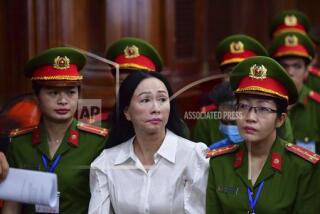Khmer Rouge leader dies, eluding war crimes verdict
NEW DELHI -- The death Thursday of one of the last senior leaders of Cambodia’s brutal Khmer Rouge regime before his trial concluded underscores flaws in the war-crimes tribunal process that threaten to undermine the pursuit of global justice, according to lawyers, human rights activists and victims.
Ieng Sary, 87, who died after a battle with heart disease and high blood pressure, was co-founder and foreign minister of the Khmer Rouge. An estimated 1.7 million Cambodians, one quarter of the nation’s population at the time, died of disease, starvation, forced labor and execution during its 1975-79 reign.
As news of Sary’s death spread, many aging victims of the bloodbath, depicted in the 1984 film, “The Killing Fields,” expressed concern they might not live long enough to see justice served, given the tribunal’s slow pace.
“I feel regret that we lost an important person who could provide answers to many questions,” said Chen Mut, 75, a retired farmer from Ampil Chum, who saw 20 family members, including his son, die during the Khmer Rouge years.
“With his [Sary’s] death, I lost a chance to hear his explanation,” he added, in an interview arranged through the Phnom Penh’s Documentation Center of Cambodia, which is devoted to preserving the history of this brutal period.
Sary was one of three remaining defendants in a joint Cambodia-international war crimes tribunal, raising fears that chief Khmer Rouge ideologist Nuon Chea, 86, and former head of state Khieu Samphan, 81, could die as well before their cases conclude.
All three have denied charges that include crimes against humanity and genocide, while Sary long maintained he had no knowledge of the regime’s atrocities.
“Good riddance to a non-repentant war criminal,” said Theary Seng, founder of Phnom Penh-based Center for Cambodian Civic Education, a charity group that promotes democracy, adding that this was an occasion for national soul searching. “Justice delayed is justice denied.”
The tribunal has settled just one of its five cases with the sentencing in 2010 of former prison chief Kaing Guek Eav, or Duch, to life in prison for overseeing the deaths of about 15,000 prisoners. The fifth defendant, Sary’s wife, Ieng Thirith, 81, was ruled unfit to stand trial in 2010 given a degenerative mental illness.
Critics say Sary’s death underscores weaknesses in the tribunal process. Phnom Penh has often dragged its heels, given that many former Khmer Rouge members are close to or part of the Cambodian government. Aging defendants have been repeatedly hospitalized. Political infighting has raged. And international funding for the tribunal has waned, with proceedings stalled since March 5 by a strike of court interpreters.
“We want to see some success,” said Rupert Abbott, Asia researcher with the human rights group Amnesty International. “This death might be the moment when people wake up. We’ve got to focus.”
Critics say the tribunal has failed to deliver legal justice or national reconciliation.
“The victims deserve closure, and the court must be allowed to complete its work,” said Youk Chhang, director of the Documentation Center of Cambodia. “His death is no victory and carries little value for the regime’s victims.”
While war crimes tribunals can deter future atrocities, Abbott said, they should learn from Cambodia’s flawed example: Don’t delay. Ensure the court is well funded and free from outside interference. And find a way for victims, particularly those at society’s lower levels, to have a voice.
“Many people have neighbors who did atrocious things,” Abbott said. “Sometimes the legal process alone is not the best way to find out what really happened.”
Khmer Rouge leaders with their radical brand of socialism may have set out to build a perfect society. But this translated into brutal implementation, including forced marches to relocate millions of city dwellers to rural labor camps.
Sary started his climb to the top of the Khmer Rouge ranks as the son of a farmer. He studied in Paris, funded by his family’s rice harvest, before returning to join the movement’s central committee and marry Thirith, Cambodia’s future social affairs minister. The marriage also made him the brother-in-law of the movement’s infamous leader Pol Pot, known as Brother Number One.
As Cambodia’s top diplomat in the late 1970s, Sary convinced hundreds of intellectuals to return, only to be arrested at the airport and face death in “re-education camps.” After the Khmer Rouge was overthrown in 1979 by Vietnamese troops, the movement’s top leaders retreated to the jungle.
Sary, a former student radical, was the first senior leader to defect in 1996, bringing thousands of low-level fighters with him. This, combined with Pol Pot’s death in 1998, helped bring about the movement’s demise.
Any initial goodwill and a limited amnesty of his defection ended, however, when the war crimes tribunal opened in 2006. He and his wife were arrested in 2007 and went on trial beginning in 2009.
His death has left many Cambodians with mixed feelings.
“We’ve lost another living document,” said Vannarith Chheang, executive director of the Cambodian Institute for Cooperation and Peace, a civic group. “Thirty-five years after committing such heinous crimes, they’re still getting away with it.”
ALSO:
The men who will not be pope (this time)
Pope Francis, soccer fan, scores with Argentina media
Vatican insiders didn’t predict Bergoglio, but who did?
More to Read
Start your day right
Sign up for Essential California for news, features and recommendations from the L.A. Times and beyond in your inbox six days a week.
You may occasionally receive promotional content from the Los Angeles Times.






